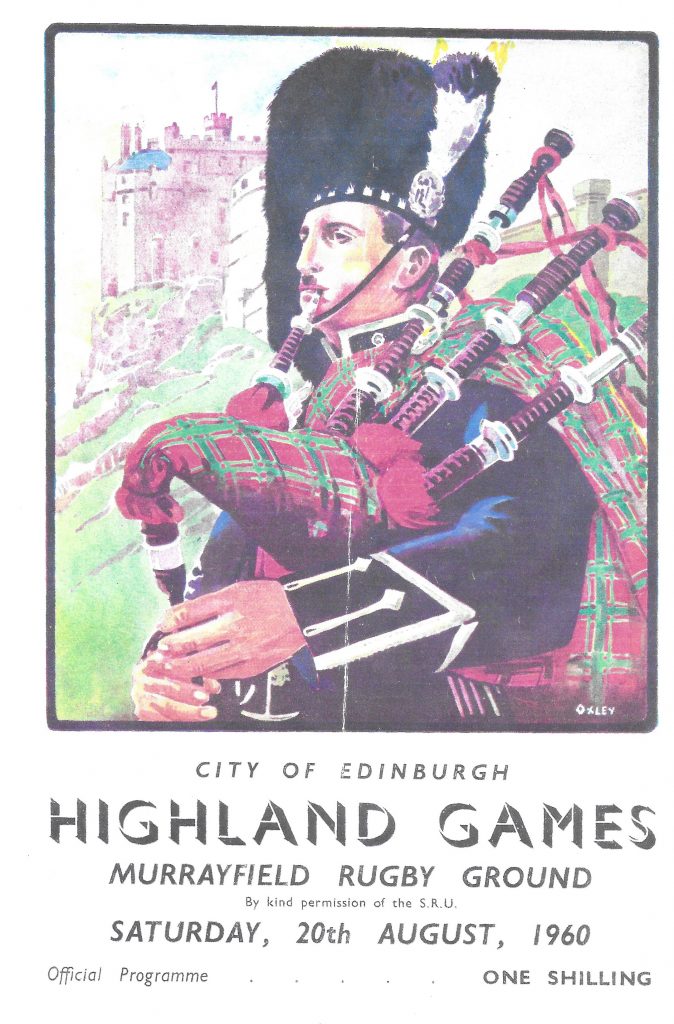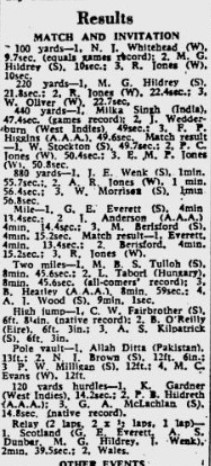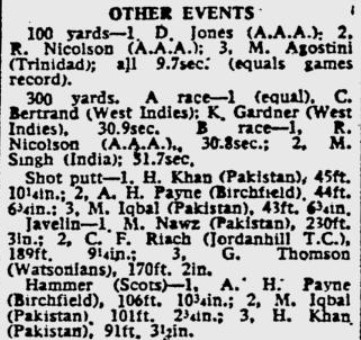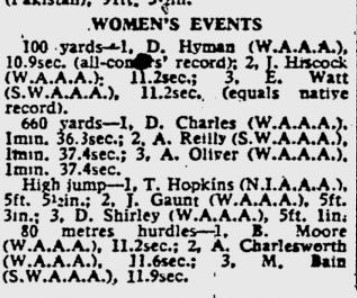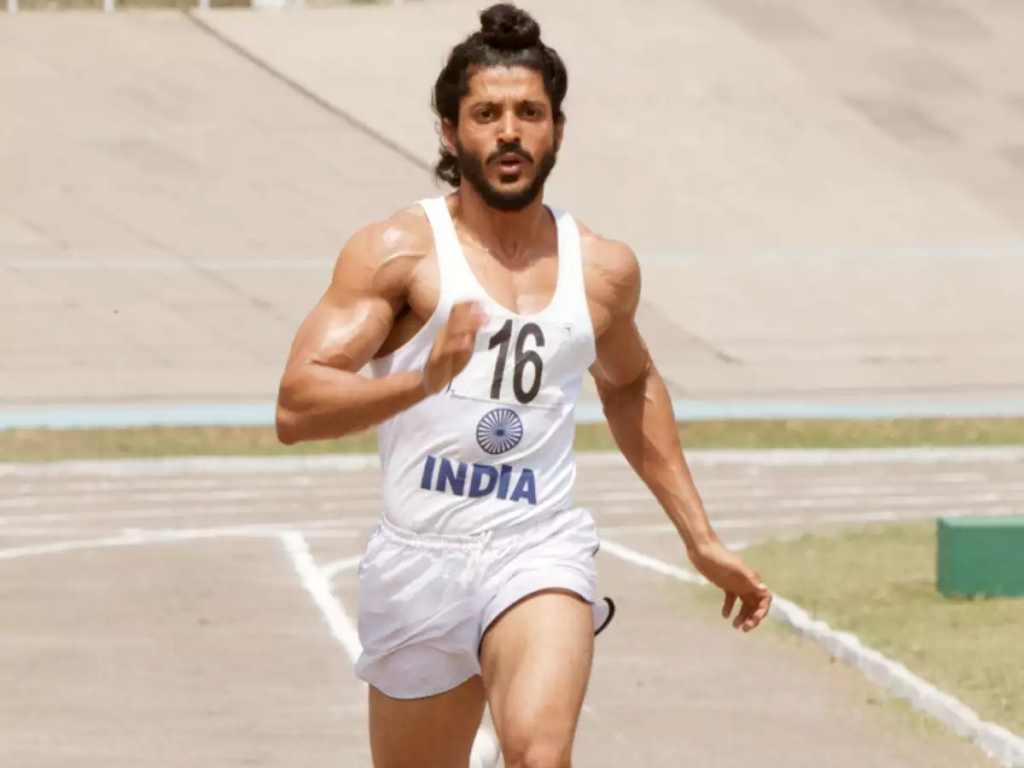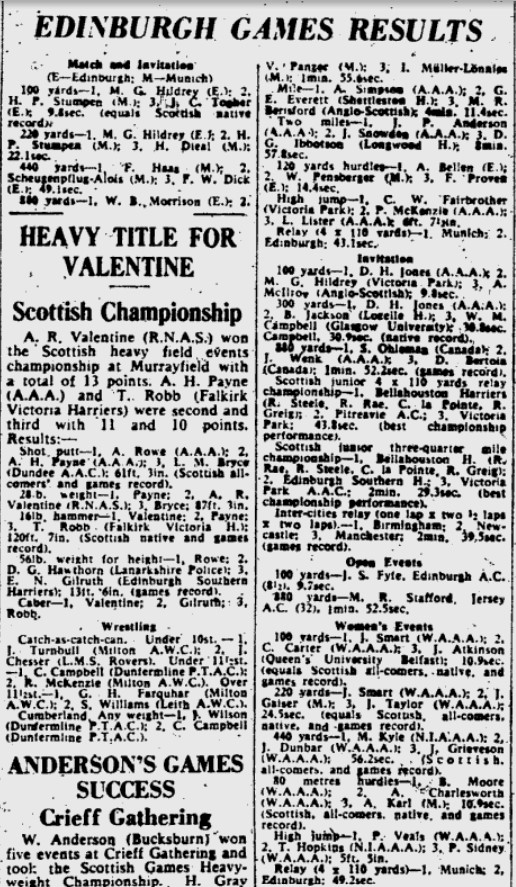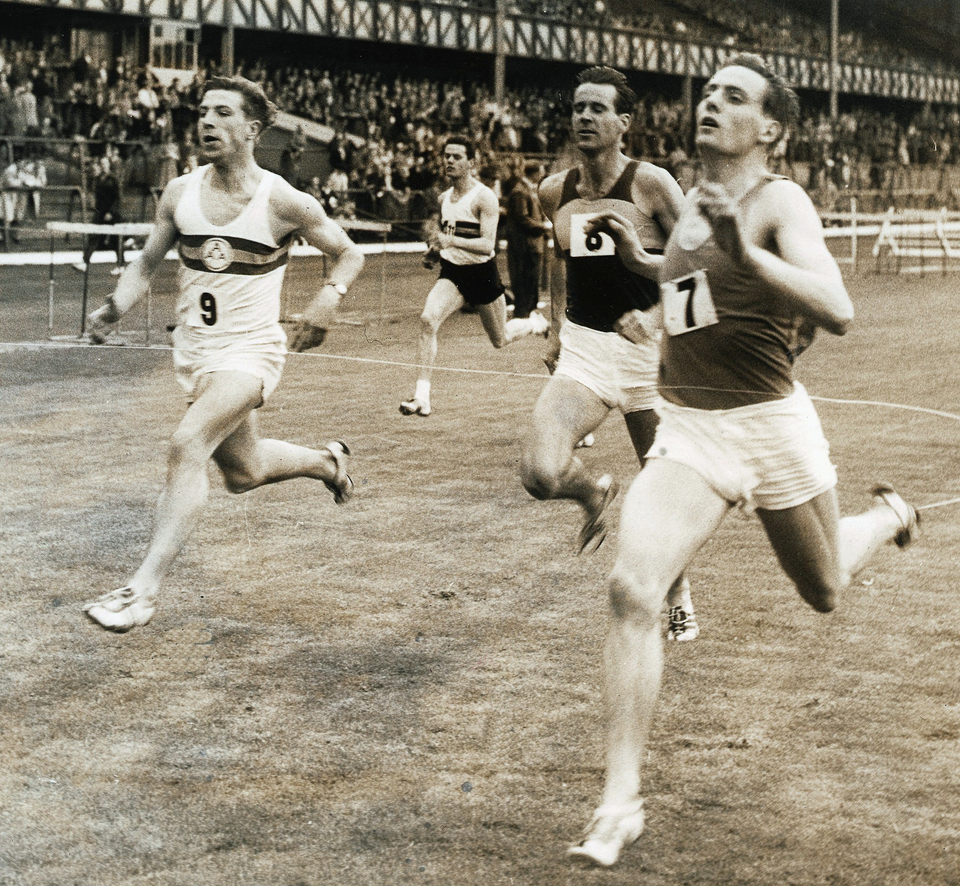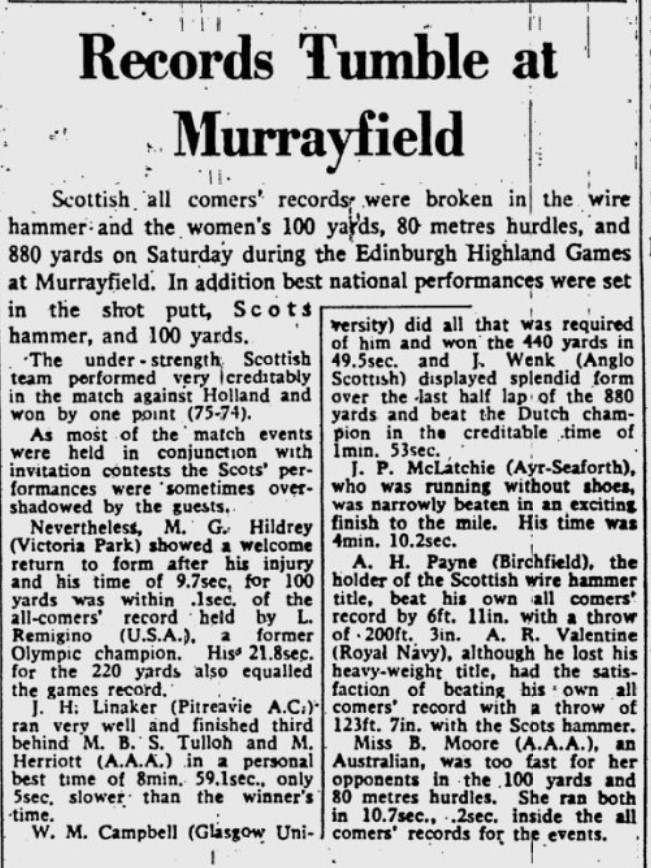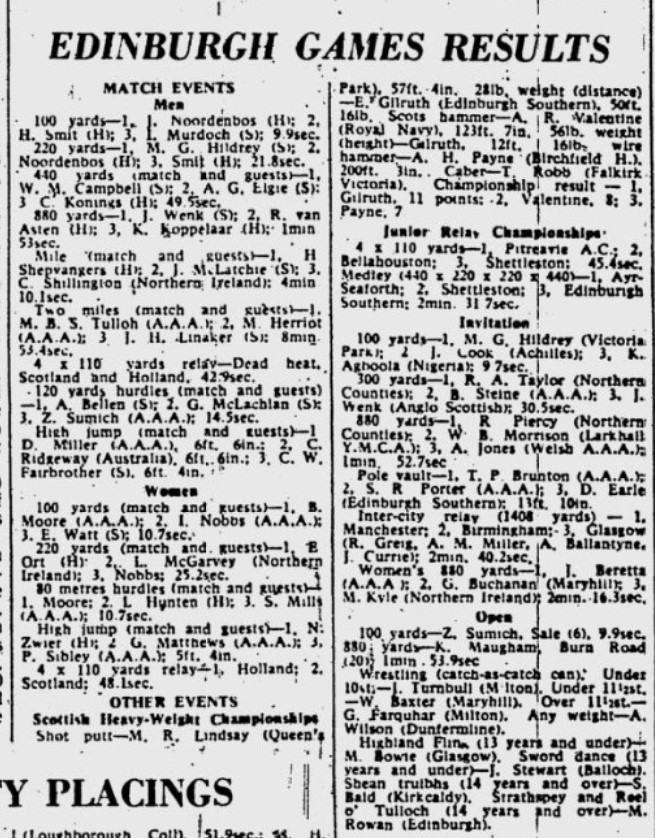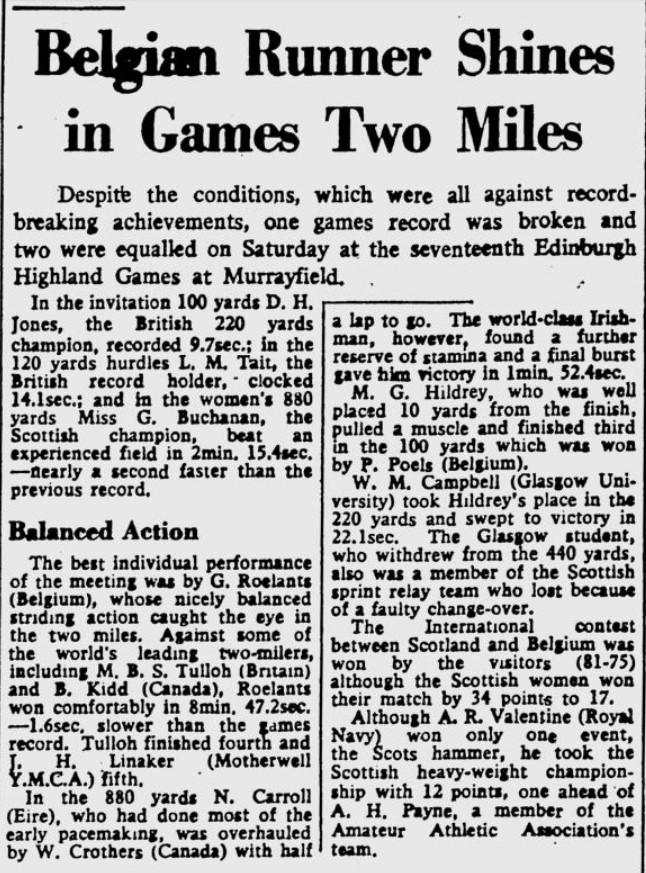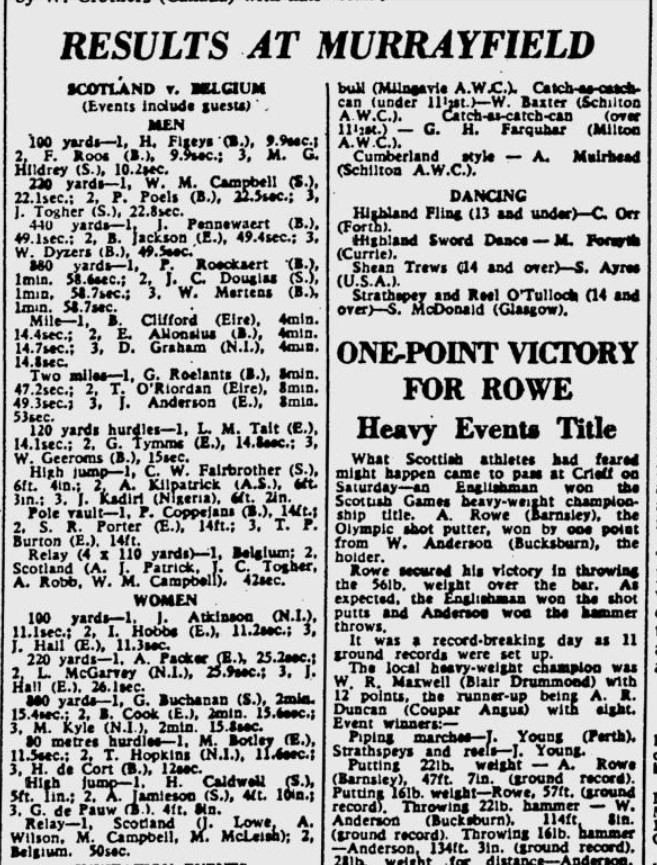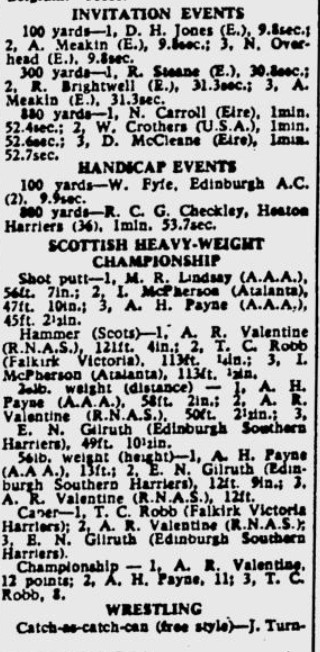The Edinburgh Highland Games, masterminded by Willie Carmichael had been one of the very best meetings on the Scottish athletics calendar. Despite the fact that it was run on a short track, a grassy one at that, it always attracted the very best runners from Britain and abroad. 1960 was no exception. The report in the Glasgow Herald had the headline “TULLOH’S FINE VICTORY IN THE TWO MILES” and among the other competitors were Laszlo Tabori, Graham Everett, Milka Singh, DH Jones and N Whitehead (Wales), R Nicolson (AAA), Mike Agostini (Trinidad), and Mike Hildrey (Scotland) all starred on the track, and in the field events, Crawford Fairbrother won the high jump. The meeting also incorporated a Scotland v Wales international which Scotland won 68 – 34. The report read as follows:
“The fourteenth annual Edinburgh Highland Games on Saturday at Murrayfield contained a few exciting contests for individual sypremacy. Two all-comers records were broken, the two miles and the women’s 100 yards. The two miles race was the most interesting. As the race progressed it became clear that there were only two runners in it – L Tabori a former world mile record holder, and MBS Tulloh, a former AAA three miles champion, who now holds the British three miles record of 13 min 17.2 sec. Tabori and Tulloh took turns in the lead until the last lap when Tabori increased the pace. Twenty yards short of the finish Tabori put in a final burst but he could not shake off Tulloh who pulled ahead and won by inches. The time of 8 min 45.6 sec accredited to both runners is three seconds better than that returned by GD Ibbotson last year at Ibrox even though Tabori and Tulloh were on a grass track of five laps to the mile. o fewer than four runners – DH Jones and N Whitehead (both Wales), R Nicolson (AAA) and M Agostini (Trinidad) – returned 9.7 sec for 100 yards equalling the Games Record.
Native Records. Native records were established by CW Fairbrother (Victoria Park) in the high jump of 6′ 8 1/4″, GA McLachlan (St Modan’s AC) who won the 120 yards hurdles in 14.8 sec, and Miss M Bain in the 80 metres hurdles with an 11.9. MG Hildrey (Victoria Park AAC) established a Games record of 21.8 seconds for the 220 yards. McLachlan had a fine race knocking down a few hurdles and yet beating by half a second the standing native record. Obviously he revels in good competitionamd having attributes of height and speed, he should make a fine hurdler under the guidance of the national coach.
GE Everett (Shettleston Harriers) won the mile from Englishmen who have previously beaten him more than once – and he dis so using more tactical methods than usual, returning 4 min 13.4 sec – slow by present day standards.”
Among those international athletes taking part were
Milka Singh, (pictured below) who ran in three Olympics (Melbourne, Rome and Tokyo) and won 400m gold in the Asian Games in 1958 and 1962, and also in the Empire (later Commonwealth) Games at Cardiff in 1958.
Mike Agostini, was a Trinidadian who was the first from his country to win gold at The Empire/Commonwealth Games when he won the 100m at Vancouver in 1954 and there was bronze in Cardiff in 1958. He was also a medallist in the Pan American Games.
Alla Ditta was a pole vaulter who competed at the Olympics in Melbourne and Rome, Commonwealth Games in Cardiff and Melbourne, and Asian Games in 1958 and 1962. In the Asian Games in 1958 in Tokyo, all of the first three cleared the same height (4.20m) and he was placed third.
The programme for this meeting can be found here: It makes great reading if you want to see just how good the fields were and to what depth the quality went.
There were several last-minute call offs for the 1961 Games which would have ruined any meeting but those who did turn up included Arthur Rowe (gold medals in the Empire Games in 1958 and in the European Games that same year, Olympian in 1960) , Maeve Kyle (outstanding Irish athlete who competed in both Rome and Tokyo Olympics), Derek Ibbotson, the two Saltwell Harriers Anderson and Hillen, as well as many of the top Scots like Mike Hildrey, Graham Everett, Scotland’s first four minute miler Mike Berisford, Ming Campbell and Crawford Fairbrother who had both captained the GB athletics team and many more. The report read:
“More than 20 records were broken or equalled at Edinburgh Highland Games on Saturday at Murrayfield, and there might have been more if the men of the calibre of HC Elliot (Australia) and H Jerome (Canada) had not called off at practically the last minute. Perhaps the outstanding achievement of the meeting was by A Rowe, holder of the British and European shot putt record of 63 ft 9 1/4 in. His 61 ft 3 1/2 in beat WP O’Brien’s Scottish all-comers’ record by no less than 3 ft 5 1/4 in. Miss B Moore who is said to have a Scottish qualification, won the 80 metres hurdles in the excellent time of 10.9 sec taking 0.2 sec off the all-comers’ record held by Miss N Thrower (Holland).
Another all-comers’ record was the product of a splendid duel between Mrs M Kyle (Northern Ireland), the British champion, and Miss J Dunbar in the quarter mile. The judges were faced with a problem as the two women crossed the line with little between then in the fine time of 56.2 sec., 0.6 better than Mrs Kyle’s record established last year. Miss Dunbar was however credited with 0.1 slowerwhich may help her claim for a Scottish native record if her qualifications are ascertained. The native record is held by Mrs JG Herman with 58.3 sec. Miss J Smart with 10.9 sec and 24.5 sec winning times for the 100 yards and 220 yards displayed undoubted superiority, equalling the present all-comers’ record and beating the Scottish native record in the course of her stylish run. Munich beat Edinburgh by 70 points to 65 only by winning the last event. MG Hildrey won the 100 yards in 9.8 sec and 220 yards in 22.1 sec. GE Everett made a brave effort to win the mile and looked like doing so when he took the lead about a furlong from the finish, but A Simpson came again, passed him 15 yards out and beat him by a foot in 4 min 11.4 sec. K Wood eas a starter but tripped and fell during the first half of the race.
The feature of the 300 yards invitation was the performance of WM Campbell (Glasgow University) who finished third to DH Jones, only 0.1 sec behind and set a native record of 30.9 sec, thus eliminating the 47 year old record in the name of Captain Hallswell. Bellahouston Harriers won the two Scottish junior relay titles in best championship times.”
Mike Hildrey (nearest camera)
Where the other major athletics meetings were held on cinder or ash tracks of a uniform 440 yards, the Murrayfield track was more akin to any of the various Highland Games or Sports Meeting venues such as Strathallan, Babcock’s or Brockville. It was on grass which at times could be treacherous after midweek rain, and was five laps to the mile. The quality of the athletes on display is down to the credit of Willie Carmichael and his committee, but the performances were down to the athletes and the intense competitive atmosphere. Despite the fact that many of the world’s best had competed at Ibrox, Hampden and Meadowbank, there were still all-comers’ records being set at Murrayfield. 1962 was no exception – The actual Glasgow Herald report is below:
Note that the Scots who had a good day included not only those like Mike Hildrey, who seemed to enjoy Murrayfield, who won their event but others who responded to the competition and ran even better than they did most Saturdays in the year. Note John Linaker’s fine run and Ming Campbell’s victory in the 440 yards. Anyone who saw Remigino run at Ibrox on his way home from the Helsinki Olympics, will see Hildrey’s 100 yards as arguably the performance of the meeting. Full results below.
In 1963 a runner who was to run a world beating race in Scotland in 1969 stole the show: Gaston Roelants won the two miles race comfortably from Bruce Tulloh and Canadian Olympian Bruce Kidd with Scotland’s John Linaker having another good run at these games in fifth place. It was an amazing field in this race:
Roelants had won the International Cross Country Championship in 1962 and was world number one ranked steeplechaser every year from 1962 to 1963 and again in 1972.
Kidd was a most interesting athlete and had won the Six Miles in the 1962 British Empire Games and took third place in the 3 miles. He also ran in the 1964 Olympics so he was at the peak of his form when he ran in Edinburgh.
Tulloh had won the gold in the European Championships in Belgrade in 1962 and the former Scot also ran for England in the one and three miles races at the British Empire Games in the same year.
The 800 metres also had a Canadian Olympian – Bill Crothers at one time held the Canadian record for every distance from 400 metres to 1500m and in 1963 had the fastest time in the world for 800m. Not in Edinburgh though where he was second to Ireland’s Noel Carroll (summer Olympics in 1964 and 1968, set Irish and European records in the 1960s and studied at Villanova in USA), and one place in front of D McCleane (Ireland) with all three being within 0.3 of a second at the finish. McCleane was another Olympian who competed at the 1964 Olympics. The standards were remarkably high – the competitors in the field events, the Heavy Events had such luminaries as Howard Payne, Mike Lindsay both Olympians, and in the Jumps Crawford Fairbrother was another Scot who had a victory to celebrate. Read about the meeting below and have a good look at the results where such well known names as Ming Campbell, Mike Hildrey and many more Scots stand out.
1964 was Olympic year and the third Saturday in August was the date for a major meeting in London and that was where several of the top Scots were in action. There were no Canadians at Murrayfield either but there were Americans, some outstanding Americans, Irishmen, a AAA’s team, an inter-city between Edinburgh and Munich and many top Scots both at the time of the meeting and future prospects. Report and results below but first, some comments on the athletes competing. The American sprinters were
Mike Larrabee who would win gold in the 1964 Olympics which were to be held in October, in the 400m and the 4z 400m relay. He won the invitation 100 yards in Edinburgh and was third in the 300 yards.
Olan Cassell also won gold in the 4 x 400m relay in the 1964 Olympics, having previously won gold in the 4 x 100m and 4 x 400m USA team at the Pan American Games in 1963 where he also won silver for the 200m sprint. In Edinburgh he won the 440 yards, defeated Crawford Fairbrother in the high jump and was third in the 120 yards hurdles.
There were many top class performances on the day by Scots athletes – eg in the Two Miles the first three were all Scots who competed in the Olympics plus many who would become household names in the next few years. Les Piggott was winner of the 100 yards and would go on to many top class performances for his country.
It would be wrong to under estimate the superb quality of many of the Scots athletes who were regulars at Murrayfield. For instance Crawford Fairbrother won the SAAA championship 13 consecutive times, represented GB 53 times and captained the team on occasion; WM Campbell won 10 Scottish titles over 100, 220 and 440 yards including a double treble: ie champion at 100 yards, 220 yards and 440 yards in the same year on two separate occasions, and captained the GB team in 1965 and 1966 and at one point in 1967 was called “the fastest white man on the planet” after running 10.2 seconds for the 100 yards twice in the same year.
